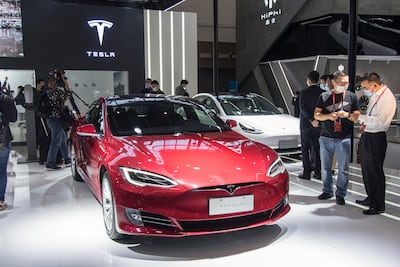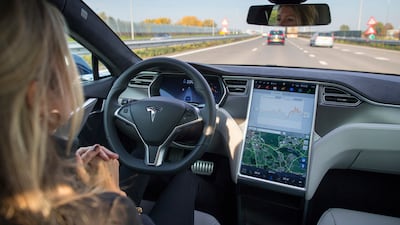Dutch forensic scientists have successfully broken open electric carmaker Tesla’s closely guarded driver data storage system, discovering information that could be used to investigate serious accidents.
The Netherlands Forensic Institute on Thursday said it was the first institute to succeed in reading, translating and publishing the coded driving data that Tesla stores in its cars.
It said it was making its results public so road accident analysts around the world can also benefit from the information. “It helps finding the truth after accidents,” it said on its website.
It was already known that Tesla cars store data from accidents, but the NFI said it had discovered far more data than investigators had previously been aware.
The NFI said the decrypted data showed Tesla vehicles stored information about the operation of its driver assistance system, known as Autopilot. The vehicles also record speed, accelerator pedal position, steering wheel angle and brake usage, and depending on how the vehicle is used, that data can be stored for more than a year.
"These data contain a wealth of information for forensic investigators and traffic accident analysts and can help with a criminal investigation after a fatal traffic accident or an accident with injury," Francis Hoogendijk, a digital investigator at the NFI, said.
Tesla did not immediately respond to a request for comment.
The Dutch lab said that rather than seek the data from Tesla, it had "reverse engineered" data logs – a process where software is deconstructed to extract information – present in Tesla vehicles "to objectively investigate them".
The NFI described which information can be found in the different types of Tesla vehicle and how to access this data.
It also found that speed measurements were very accurate.

“We carried out tests with a Tesla Model S, so that we could record the accuracy of the registered measurements,” says Hoogendijk.
“Having this kind of data allows for a more detailed investigation of accidents, especially into the role of driver assistance systems,” Mr Hoogendijk said.
“In a Dutch case it showed how a driver got too much confidence in the Autopilot. The driver did not notice that he was only activating the adaptive cruise control and not the lane keeping assistant and then became distracted for too long. This caused the Tesla to end up in the other lane, resulting in a fatal crash.”
With the data it is also possible to reconstruct the route to a certain extent, even though the logs do not contain GPS information, Mr Hoogendijk said: “If one knows a location and course in time, it is possible to calculate the speed of the use the vehicle and the position of the steering wheel.”
The NFI also investigated a collision involving a Tesla driver using Autopilot and a car in front of it that suddenly braked hard.
The investigation showed the Tesla driver reacted within the expected response time to a warning to resume control of the car, but the collision occurred because the Tesla was following the other vehicle too closely in busy traffic.
"That makes it interesting, because who is responsible for the following distance: the car or the driver?" said NFI investigator Aart Spek.
The NFI said Tesla encrypts its coded driving data to keep its technology secure from other manufacturers and protect driver privacy. Car owners can request their data, including camera footage, in the event of an accident.
This year, Tesla said it had established a site in China to store car data locally, as carmakers came under growing scrutiny over how they handle information collected by vehicle cameras and sensors.
The NFI found that Tesla had complied with data requests from the Dutch authorities, but left out a lot of information that could have proven useful.
"Tesla however only supplies a specific subset of signals, only the ones requested, for a specific timeframe, whereas the log files contain all the recorded signals," the NFI's report said.
By decrypting Tesla's code, the NFI now knows more about what kind of data the carmaker is storing and for how long, allowing for more detailed data requests, Mr Hoogendijk said.
"You cannot claim what you do not know, so it's helpful that we now know what else is being stored," he said.
Mr Hoogendijk said this also applies to other carmakers, as investigators simply do not know how much and what kind of data that manufacturers store or for how long.
Tesla has remote access to the data, the lab said, which is periodically uploaded from cars and used by the company for product improvements or to fix malfunctions.
The NFI said it had obtained data from Tesla models S, Y, X and the mass-market Model 3 and shared the results at a conference of the European Association for Accident Research so that other accident analysts can use it.
In August, the US National Highway Traffic Safety Administration opened a formal safety probe into Tesla's Autopilot system in 765,000 vehicles after a series of crashes involving Tesla models and emergency vehicles.
To date, NHTSA has identified 12 crashes that involved Tesla vehicles using the advanced driver-assistance systems and emergency vehicles. NHTSA said most of the incidents took place after dark.


